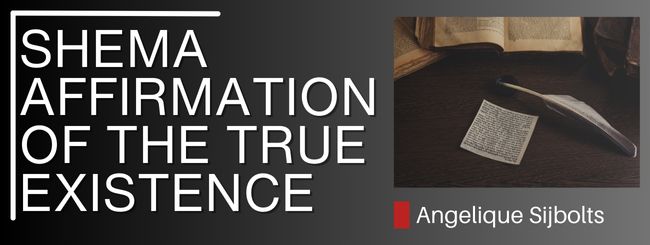בס”ד
The “Shema” holds a special place in Jewish tradition. It is one of the first prayers a Jewish child learns and the last words a Jew utters with their final breath. But it’s much more than a mere declaration of faith in the existence of G-d; it is a profound affirmation that G-d is the sole true existence. It signifies an unwavering belief that nothing in this world exists independently of Him. The “Shema” is a declaration of G-d’s absolute Kingship, a sovereignty that extends over all of His creations. It embodies the faith that He is the creator of light and the bringer of darkness, even when our understanding falters, and we find ourselves shrouded in the obscurity of life’s challenges.
The first Lubavitcher Rebbe provided a valuable insight into the meaning of “Shema.” He interpreted it as an acronym for “s’u marom eineichem,” which translates to “Raise your eyes on high.” The use of “on high” (marom) instead of “to the heavens” (shamayim) suggests that our gaze should be directed to ever-higher spiritual levels, transcending mere intellect. It encourages us to intellectually grasp the profound message within the verse: “and see Who created these.”
In times of darkness and uncertainty, it becomes imperative to lift our gaze higher and higher until we gain a deeper understanding of the fact that G-d ultimately controls everything. This principle is beautifully illustrated in the biblical account of the Israelites’ battle against Amalek. When they looked up to Moses, whose hands were directed towards the heavens, they achieved victory. This underscores that, regardless of the prowess of an army, ultimate triumph is bestowed by G-d (Exodus 17). A similar lesson is found in the story of the venomous snakes; those who looked up at the snake on the staff and raised their eyes to the heavens found salvation (Numeri 21).
A Jew is commanded to recite the Shema at least twice a day. However, a righteous non-Jew is not obligated by this commandment. It is entirely permissible for a righteous non-Jew to read or pray any verse from the Tenach. Therefore, there is no prohibition for a righteous non-Jew to recite the Shema. Nevertheless, if one chooses to recite the entire Shema, including the portions that mention, for instance, the commandment to affix a Mezuzah, it is crucial to be aware that these are not commandments for righteous non-Jews.
Hence, it may be wiser, if one wishes to recite it as a prayer, to recite only the first part, which is as follows:
Hear, Israel: A-donoy is our G-d, Adonoy is One.
The following two lines are to be said silently:
Blessed [is His] Name, Whose glorious kingdom is forever and ever.
And you shall love A-donoy your G-d with all your heart and with all your soul and with all your possessions. And these words which I command you today shall be upon your heart. And you shall teach them sharply to your children. And you shall discuss them when you sit in your house, and when you travel on the road, and when you lie down and when you rise.
As we have seen, the “Shema” is an acknowledgment of G-d’s absolute unity and Kingship. A suitable alternative for righteous non-Jews can be the following prayer, which can be found in the AskNoah prayer book:
Almighty G-d, we accept upon ourselves that which is written in Your Torah: “You shall know this day and take to your heart that G-d [alone] is G-d, in the Heaven above and on the earth below – there is none other!
We affirm the precepts of “You shall love G-d, your G-d with all your heart, and all your soul, and all your might” and “Fear the L-rd, your G-d, and serve Him, and in His name [alone] shall you vow;” and as it says, “Fear G-d and keep His commandments, for that is a person’s entire duty.”
The message is clear, whether you are a Jew reciting the “Shema,” a righteous non-Jew reciting all or part of the “Shema,” or using the above-mentioned prayer. The essential point is to place your complete trust in G-d, even when confronted with life’s perplexing circumstances. He is the ultimate source of victory and will never forsake His people.
By Angelique Sijbolts
Sources:
© Copyright, all rights reserved. If you enjoyed this article, we encourage you to distribute it further.
Our blogs may contain texts/ quotes or references of
Mechon-Mamre.org, Aish.com, Sefaria.org or AskNoah.org
that contain copyrights and which we may use with there permission.
